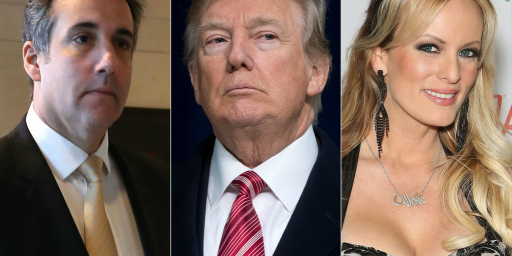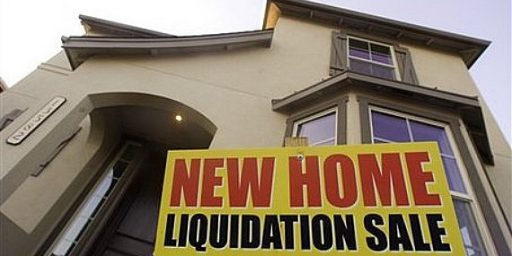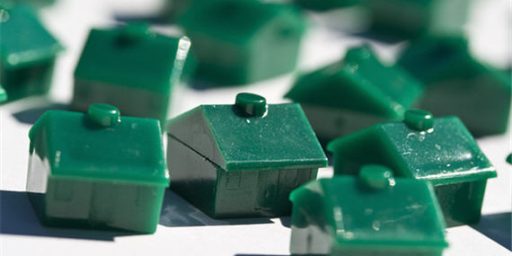Housing Bubbles and Rent Ratios
Bruce Barlett observes that the Fed’s recent increases in the discount rate will increase the likelihood that the so-called “housing bubble” will burst.
As the Federal Reserve moves to raise short-term interest rates once again, flags are raised about the effect on housing prices. With housing being the largest household asset — and one that has risen sharply over the last several years — a downturn in housing prices akin to the fall in stock prices since 2000 would be devastating to families and the economy.
*** A key concern is that mortgage lenders now often lend to homebuyers with no money down. Until recently, they have usually demanded a 10 percent to 20 percent down payment before one could obtain a mortgage, in order to protect themselves from housing downturns. Further, many homebuyers now have adjustable rate mortgages, which rise automatically when interest rates rise, rather than fixed-rate mortgages that remain the same no matter what happens to interest rates.
Bartlett remains optimistic about the continued wisdom of home ownership:
Prudence suggests that it would be unwise to buy a house in the expectation of future price increases like those we have seen. However, those planning to stay put for a few years should not suffer. In any event, all homeowners would be well advised to get out of ARM’s and refinance into fixed rate mortgages as soon as possible.
Matthew Yglesias focuses on the disparity beween monthly mortgage payments and rental values.
If demand for home purchases is rising faster than demand for home rentals, it seems to me that that can only mean that people are buying houses as speculative commodities — spending more than the house is really worth to them in the expectation that it’s value will only increase in the future
As Matt’s commenters note, there are numerous non-economic reasons for buying a home. Still, off the top of my head, three major economic advantages exist for buying vice renting:
- A huge deduction on federal income taxes subsidizes the former. Thus, a somewhat higher mortage payment will be offset by the tax advantage.
- Hedge against inflation: One locks in one’s monthly payment when buying whereas rent continues to escalate. (Granted, insurance, utilities, and other costs will escalate.)
- Equity: Even if the price doesn’t appreciate, part of the money one pays monthly accrues as value (admittedly, a small part in the early years of traditional mortgages). If the house price does appreciate, that added value is also gained upon resale. Even if one buys again in the same housing market, this nets a huge down payment on the next, more luxurious home.
These advantages are offset somewhat by the increased expenses of owning a home–repairs, upkeep, added pressures to spend more money on decor and such–but not enough to make ownership a poor choice in most cases.
Still, like Bartlett, I’m concerned about the upward trend in interest rates. Those of us who live in very expensive housing markets tend to have more of our monthly income channeled into housing. A conventional mortgage, while secure, is generally a poor choice for those not intending to remain in a house for several years, since ARMs offer substantially lower initial rates and thus lower monthly payments and/or the ability to buy “more house.”





For most people, buying a house is a “two-fer”–it provides housing for 20 years, and then becomes an asset one can retire upon.
After 20 years of renting, you have nothing (except, in many cases, lower rent–because landlords increase rent more when they get new tenants in than they do when it’s the same person year after year [and many municipalities have some minimal kind of rent control that protects existing tenants]).
Of course the one point that Yglesias, not surisingly misses, is that when the economy gets better, home ownership goes up. (One would hardly be expecting Yglesias to give any serious hearing to the idea that under W the economy is good enough for more peple to afford their own home!)
The idea that it’s simply people moving out of rentals and ito home ownership is further backed by the idea that despite the Fed taking a rate hike the other day, interest rates are still on a historical basis, rather low.
Since home-ownership is so closely tied to the current tax structure, it will be interesting to see what happens as Bush attempts to engage in tax “reform.”
James mentioned one of the major governmental subsidies that homeowners have over renters–deduction of mortgage interest from federal income taxes. The other is the ability to deduct local property taxes.
Apparently, Bush has gone on record as saying that the mortage interest subsidy isn’t going away (not that this means much since Bush’s credibility when it comes to keeping his word is suspect in many areas). Since the main beneficiary of this government welfare program are suburban homeowners in Republican districts, I wouldn’t expect COngress to pass any “reform” that eliminated this.
However, some of the more radical tax plans by some Republicans do call for this elimination–as well as the property tax subsidy.
The problem, of course, is that Bush’s economic plan is entirely conradictory–reducing taxes, increasing spending, & building up deficits. The dollar’s recent fall is evidence of the internatinoal financial community’s tepidness about Bush’s so-called “plan.”
For more on this:
http://www.modbee.com/business/story/9575784p-10465142c.html
http://www.magicvalley.com/news/worldnation/index.asp?StoryID=11462
I follow the UK housing market. This market has recently seen Interest Rates shift to favour savers, and the housing market has stagnated and started to fall, starting in London and spreading outwards.
Housing is currently a bubble (at least in the UK), people are using Mortgage Equity Withdrawal(MEW) to fund general consumption like purchasing a car. (A car bought in such a way will be rust long before the 20-25 year loan is paid off.) This long term debt has been sustaining the UK consumer economy. Then there’s the BtL (Buy to Let) market that has been buying up houses, (and pushing the prices up further) in order to rent them out at interest costs, and collect the capital gain on the house.
Lots of the UK also uses self-certification (self-cert) mortgages where the bank “trusts” the house buyers declared income. This has led to higher multiples being loaned out, and higher loans = higher prices, but at much higher gearing and risk opacity!
The way to spot a bubble is that people are buying for the capital gain, and not the yield. House prices are a bubble in the UK, and IMHO high house prices have been a drag on the economy. A crash would be good, not bad.